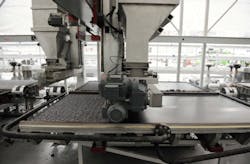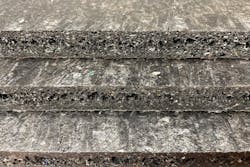From the Summer 2025 issue of Plastics Recycling.
By Marissa McNees
Addressing plastic pollution isn’t easy, especially when it comes to electronics plastics, but Synergy Electronics Recycling (SER), an end-of-life electronics recycler based in Madison, N.C., has made it part of its mission to do just that.
The company was established in 2000 and offers end-of-life processing, certified data destruction and information technology asset disposition (ITAD), servicing many county programs across North Carolina and South Carolina.
“Pretty much any company is going to generate electronics that they aren't using anymore, so we’ll come in and take that material off their hands for them,” SER Director of Sales and Compliance Megan Tabb said at the Carolina Recycling Association (CRA) 35th annual conference and trade show at the end of March.
Tabb, who spoke during a session called E-Waste Recycling Innovations, said SER works with lots of original equipment manufacturers, or OEMs, who might have devices that need processed because of recalls, for example.
SER employs manual and mechanical disassembly and, according to the company, it has invested heavily in shredding and mechanical separation equipment.
“One of the tricky things about electronics is that it’s not just one commodity, which you’re going to deal with a lot of times when you’re recycling something,” Tabb said. “We have a lot of commodities in one device, so, we’re going to generate precious metals via circuit boards, memory processors; we generate a lot of aluminum, steel, copper, other metals … and a whole, whole lot of plastic.”
Finding a new home for scrap
After China banned the import of 32 types of scrap materials in 2018, Tabb said SER searched for other outlets for its material. At first, other Asian countries were willing to import U.S. scrap, but, Tabb continued, “It didn’t take long before they realized the same thing China realized, which was that they were getting a lot of trash dumped on them.”
“They were getting containers of [materials] that weren't mixed plastic, or it might be this mixed plastic that had a lot of other things in them as well,” she said. “… It still is a very tricky thing to this day, but it leaves us kind of at this point where, if you are an electronics recycler, you need to find a domestic outlet for your mixed plastic.”
The challenge with electronics plastic recycling, Tabb said, is that devices typically contain many different polymers.
“You think about a printer—the outside casting is made of a certain polymer [while] all the internal [components] are made of different polymers,” she said. “… A lot of times, these polymers contain additives that manufacturers don’t want, so even if you are able to recover the ABS [acrylonitrile butadiene styrene] , for example, that’s a pretty well-known, commonly traded polymer, but a lot of times the chemical composition of that ABS doesn’t match what a manufacturer wants.”
The separation process also is expensive, Tabb continued, but the plastic needs to be separated if it’s going to be used in a new manufacturing process. However, often in that process, the amount of heat required causes the polymer to degrade, so those types of plastics can never be recycled or reused again, she said.
“We have a lot of a lot of companies in our industry right now that are trying to separate out these good polymers of plastic, which is great—they're having some success with that—but the resulting truth is this is that 45 percent of the polymers recovered through plastic separation still end up in a landfill,” she continued.
A sustainable alternative
According to Tabb, as recyclers, keeping the flow of electronic scrap moving is making sure the recycling process is entirely economically viable, and to do that, she said SER needed to make sure the material coming off its line at the end of its recycling process is as valuable as possible.
RePolyTex, a materials science company and SER subsidiary, also based in Madison, developed a proprietary technology to “address the limitations of traditional recycling methods,” and with that came the development of a line of composite boards made with recycled e-plastics: Mamba Board.
Mamba Board is a composite board manufactured in the U.S. and made from recycled e-plastics sourced in the U.S. It is made with a minimum 84 percent recycled materials, according to RePolyTex. Applications include shed building, marine industry, trailer and camper manufacturing, and it comes in three categories: Mamba Light, Mamba Standard and Mamba Ultra.
“Mamba Board is great for its solution for this mixed plastic that's going to landfill, but it also has several benefits,” Tabb said. If you compare it to plywood, for example, it's waterproof. Plywood is, of course, going to rot over time. It's resistant to termites, gasoline and oil. If you're using it as a shed floor and you park your lawnmower on it and it leaks, it's not going to hurt the plastic. It's dimensionally thermally stable, and one of the really cool things about it is that it's 100 percent recyclable.”
SER and RePolyTex were recognized at the CRA event in March for their “groundbreaking approach” to mixed plastic recycling and said Mamba Board provides a “sustainable, lower-energy alternative” to conventional building materials.
"We are excited to recognize Synergy and RePolyTex for their groundbreaking work in mixed plastic recycling,” CRA Board Vice President Emily Ball said. “Their technology is pushing the boundaries of what is possible in recycling, providing a much-needed solution to the challenges of electronic waste and mixed plastic streams. They are paving the way for a more sustainable future.”
RePolyTex also says Mamba Board is more economical than comparable virgin plastic board products, and Tabb noted the boards have been through a lot of testing to determine how the material might break down over time as it’s exposed to different weather.
Currently, recycling polymers specifically from e-plastics is SER’s primary focus, but Tabb said the company successfully has introduced other polymers into its recycling process and that it “might look at that down the road to start a new product line that uses other polymer types.”
“Right now, our primary focus is on electronics plastic because it’s such a huge problem and one that we’re familiar with,” she continued.
“We're taking materials that would otherwise end up in landfill, and we're re employing them in manufacturing product,” a RePolyTex operations employee said during the presentation. “The benefit of being able to take mixed plastics and re-employ them in newly manufactured products is a benefit to our communities, it's a benefit to our customers and it's a benefit to our global community.”
For more information
Synergy Electronics Recycling, Madison, N.C., 336-548-7014, www.synergyrecycling.com
RePolyTex, Madison, N.C., [email protected], www.repolytex.com
About the Author
Marissa McNees
Marissa McNees is Managing Editor of Recycling Today and can be reached at [email protected]. This story was published in Plastics Recycling, a joint publication of Plastics Machinery & Manufacturing and Recycling Today.


